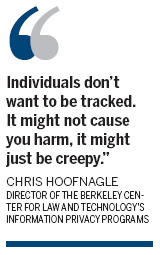Tracking what you want 24/7

Preferences monitored online, at mall
WASHINGTON - In the quest for better targeted advertising, marketers are using high-tech tools that can pinpoint a person's location, demographics and habits, raising the hackles of privacy activists.
Online or in the shopping mall, these efforts are becoming more prevalent.
Google, Yahoo and its advertising partners can track a user's browsing habits in an effort to deliver more relevant marketing messages.
Offline, new digital signs with hidden cameras can use facial recognition software to tailor messages similar to the scenario in the science-fiction film Minority Report.
Some analysts say the new technology is positive, enabling firms to get the most for their advertising dollars.
"We're marketers. We present consumers with information that they can use to make informed buying decisions related to our brands," says Rob Graham, vice president at the consulting firm Laredo Group.
But a 2009 study by the University of California and the University of Pennsylvania showed that Americans are opposed to targeted advertising on the Web.
"Contrary to what many marketers claim, most adult Americans (66 percent) do not want marketers to tailor advertisements to their interests," the study concluded.
"Moreover, when Americans are informed of three common ways that marketers gather data about people in order to tailor ads, even higher percentages ... say they would not want such advertising."
Chris Hoofnagle, director of the Berkeley Center for Law and Technology's information privacy programs, said many Web users are aware their habits are tracked by firms such as Google or Amazon, but are unsettled by third-party advertisers and marketers tracking across websites without any permission.
"Individuals don't want to be tracked," he said. "It might not cause you harm, it might just be creepy."
The practices underscore concerns over online privacy at a time when social network giant Facebook is embroiled in its own controversy over sharing data with third-party websites.
New technology is also testing the limits of acceptable practices and privacy offline. In some shopping malls, a new generation of digital signs not only can change messages frequently but can measure customer traffic and determine who is walking by through facial recognition software.
To some, it raises the specter of the scene in Minority Report where Tom Cruise's character walks through a futuristic mall.
"John Anderton. You could use a Guinness right about now," a digital sign announces in the film.
"We're not quite there yet but we are at a point where we can adjust the ads according to who is in front of that screen," said Keith Kelsen, chairman and CEO of Media Tile, a digital signage firm.
Kelsen said the signage industry has a set of guidelines to protect privacy, and dismissed most of the fears as overblown.
Agence France-Presse
(China Daily 05/28/2010 page10)














